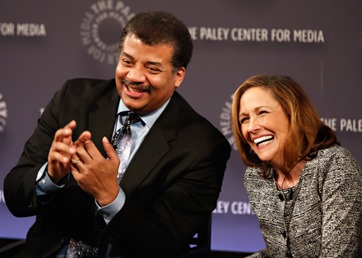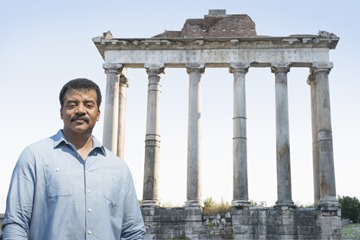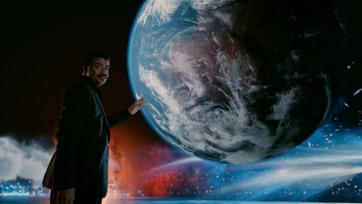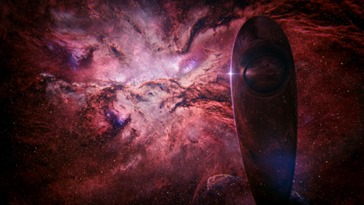Cosmos: A Spacetime Odyssey (Fox, Sundays, 9/8C; National Geographic, Mondays, 9/8C) concludes its season this evening. As with the original series, twenty-four years ago, this iteration has been a joyous exploration of the universe – reinvesting the increasing search for and appreciation of scientific knowledge with the kind of sense of wonder that put people on the moon and created powerful computers you can carry in your pocket.
On Friday, writer/producer/director Ann Druyan and host/astrophysicist Neil deGrasse Tyson spoke with a group of bloggers/journalists about the series – not so much about this evening’s finale, but about their aims and goals for the series; their thoughts on what it might have accomplished, or will yet accomplish.
For those who want more, the DVD/Blu-Ray release contains a lot of material that had to be pruned from the series for time, and will be available on Tuesday, June 10th.
First of all, I just want to thank you for being such an advocate for sanity.
Neil deGrasse Tyson: Who would have thought sanity needed an advocate?
I wanted to ask you, and I’m sorry it’s not directly related to the show, but I wanted to ask you if you were head of the space program, what would you want to focus on?
Neil: That’s a great question, and I’ve thought long and hard about that, and I realized that if I were head of the space program, I’d be reporting to the President, and so, I would have less control than one really might want to have if you have great visions for the space program, and so, also, I wouldn’t think of going into space as the focus—I wouldn’t think of any one destination as a focus relative to another as what happened in the Apollo era where the moon was the focus. If we were ever to become a space-faring civilization, then all of space needs to be considered our backyard, and if it’s all of our backyard, then the moon is one place you go to if that’s where the need takes you. Mars. An asteroid, maybe an asteroid is headed our way, you might want to deflect that when you go visit it. There are things to do in space that we should not be thinking of as one dimensionally in that sense. So, I’d say create a suite of launch vehicles that can be configured for any specific task that scientists, tourists, families, whatever is the—mining, whatever is the activity in space, it is only limited by our imagination and not by somebody’s budget.
Ann Druyan: I would just affirm everything you said, but I would also say that if I was talking to the president in that capacity, I would be urging him or her to realize that as a species and as a nation, we need ambitious exploratory goals. We need to feel as if we are still on the move because exploring the planets, searching for extraterrestrial intelligence, looking as deeply into the universe as we possibly can is a matter of human self-esteem. It’s something that enriches our culture. The pride that we all took in NASA’s majestic trips to the moon and its dispatch of our robotic emissaries to beyond the solar system, all of this has only reflected on us as a culture that believes in the future, and the dividends from those great journeys of exploration continue to redound to our good name.
Ann, I was curious—in looking back now because we spoke before the series launched in February, how it feels—did you achieve what you sought out to vision that you explained then? How did you achieve that? How does it rate now? What was the most touching moment for you putting the final touches on this last episode?
Ann: Well, I guess it’s not for me to say if I and my team achieved those goals. That remains to be seen. Personally, I have a feeling that the reaction to the series has exceeded my wildest fantasies. Last Sunday’s episode was a tremendous ratings hit, and we came in neck and neck with The Bachelorette on a show about global warming. That really sums up my greatest hope for the series, and of course, this is not only true domestically in the United States but around the world in 180 countries. So, I have a feeling of just tremendous satisfaction that FOX and Nat Geo were brave enough to put this show on primetime, which hasn’t happened on a commercial broadcast network such as FOX in recent memory, and the idea that it has been deemed a hit critically and in terms of the public means that in this slavishly-imitative entertainment business there will be more such programming. So, I am beyond gratified.
As for the most touching moment, it has come in the form of myriad tweets from people and emails from the public saying that Cosmos has brought families together, that Sunday nights have become a family time again and how many parents and children and couples are watching this series together and most of all how profoundly moved they are by what is a rigorously scientific show. That was my dream from the beginning. I hoped and I believed that there was this unsatisfied yearning for this kind of programming, and by the metrics we have thus far, I think it’s really delivered that.
That last kind of sequence in the final episode where you hear Carl’s voice, and then, Neil, your discussion on what you want, I wonder, I want to know, I really was kind of affected by that and thinking how I watched the show, the first show, when I was five, and now, I have a five-year-old daughter and how to explain it to her, and Neil, that sense of wonder, I’m wondering—you mentioned on Wednesday science is trending, how you hope to continue bringing that wonder beyond or how the series can do that through like the DVD and that kind of thing.
Neil: I think we are learning as a community of scientists and educators that to instill a sense of wonder might be the most important part of the educational effort that we can bring to bear on an audience, be that audience in a classroom or viewers of a television series, and I don’t think it was always thought of that way necessarily. There was the lesson plan, and there are some TV documentaries that are still sort of laid out that way where we have to make sure we cover these curriculum points, and then, it becomes a lesson rather than a journey, a journey of mind and emotion.
So, in this particular case, which is of course the Pale Blue Dot recitation, sort of sets up the end phrasing, which is really the goal there is to bring the viewer in with the sequence of questioning that’s going on. The summit of remarks that are being made that put together so much of what the total series is attempting to convey; hence, the set of images of the heroes that we profiled and the admitting that yes, scientists can be wrong, this is not some kind of priesthood, and the candor with which that’s all expressed, which Annie feels deeply and it was captured in the scripting of this, that we end on a note where yes, this is a journey, it’s look at how far it’s come, look at how much further it can go, and it’s our solar curiosity, if you will, that will keep that pumped. Without it, I don’t know that the country or the world or culture or civilization can go anywhere.
I’m also excited that the DVD and Blu-ray are coming out because I know there’s a lot more stuff on there that audiences can enjoy together, and you had mentioned earlier about families sitting around and watching the show together, and that’s exactly what’s been happening out there. So, thank you very much for having something like that.
Secondly, I also wanted to say to Neil, this show is kind of with the people watching it of all—scientists down to laymen watching this, you’ve become a rock star. I was just wondering if you plan to use that kind of status to continue educating in other ways even perhaps either through other scientific programs that will get kids and families to watch this and just ordinary people who wouldn’t even think of it but showing them science in a very interesting, entertaining and thought-provoking way.
Neil: I don’t have specific television ambitions in the sense that I remain fundamentally and academic, and so, my innermost ambitions are what’s the next discovery I can make; that’s in my direct center. Outside of that, the energy for that discovery and the love of doing that work is manifest by my participating in these projects, but it’s not the projects that are in the center of me, it’s sort of the scientific inquiry that’s in my center. So, if another opportunity does not arise, I’m not going to miss it in that sense.
Now, you make an important point. If there’s some kind of rock star status, would I be irresponsible if I didn’t somehow use it for a continued greater good? And I’m always involved in some way with reaching the public. I have a growingly successful radio show and podcast called StarTalk. It’s weekly in the top ten of downloads of all podcasts and iTunes. There’s always some book that I’m writing and I’m in the middle of, and so, I’m always there.
What distinguishes Cosmos here is when that opportunity arose and I spoke with Ann, I realized that I felt, whether or not anyone agreed with this, I thought I could present Cosmos uniquely. If there’s something that someone else can do, let them do it, and if I couldn’t do it uniquely, let someone else do it and I get back to the lab. But Cosmos comes up and it’s like I have this overlap, this sort of generic intersection, this culturally genetic intersection with Carl Sagan that I think people would want to know and feel and think about, and so, Cosmos came up, and there was no question that I was interested in doing Cosmos.
After that, I don’t know. It’s a long way to say, sorry it took so long to do this, I don’t know where I’ll land after Cosmos, but there’s always a little piece of me that’s reaching out to the world.
If you could get back on that Ship of Imagination one more time, where would you go?
Neil: I’d go back and hang out with Isaac Newton. I’m torn between do I hang out with him or do I bring him into the present to hang out with me. See, that might be terrifying because his head will just explode once he sees everything that was derived from his discoveries, but I’d spend more time with someone who I think is one of the most brilliant minds our species has ever known. And then, I’d go back to the Big Bang of course.
I believe people will really look forward to also having the DVD and Blu-ray coming out because I know there’s a bunch more material on there that you weren’t able to get into the 13 episodes.
Neil: Plus a Making-Of feature that should be fun for the viewer.
The timing of this call was very interesting. My 12-year-old daughter was writing a paper for school on NASA and how NASA has lost funding, and it was one of those papers where she’s trying to prove her point and get people on her side about getting NASA more funding from the government, and she quotes you, Neil, in the paper, and when I told her I was going to be doing this call today, she about cried and wanted to come, very, very excited about this and the timing is remarkable, but I am very lucky as a mother, I have one of those children that is very, very intelligent and she’s very into space, and this is something that she’s been into since she was in first or second grade. So, it hasn’t been because of things that she’s watched on TV, that’s all been a bonus, but what she wants to know and she asked me to ask this question is how do we get more young people involved and into these programs that they can become our future astronauts, our future astrophysicists, people like you, Ann, who are involved in making these programs and writing these books. She’s interested, but how does she convince people who maybe don’t have that love that she just happens to have for this? Besides the STEM programs and things at school, how do we, as someone said earlier, instill this sense of wonder in young people and get them interested because they are our future?
Ann: Well, what I would say is the first thing is to learn as much as you can about the particular field or subject of investigation that you’re most passionate about because armed with that information and with the conviction that this is something truly important, you can accomplish so much. When I started out on this project, there were so many obstacles. It took me seven years to get this, to produce, to write, to direct it, and it was you just have to have this indefatigable belief and conviction.
The other thing is that, as Carl Sagan used to say, when you’re in love, you want to tell the world. If you have the passion for the subject matter, it becomes like a pheromone. It’s almost biological in the way that it spreads when you communicate with other people.
So, I think the first thing is that solid education, that solid grounding in the material because as Cosmos seems to indicate, people do have a hunger for this, and it’s not as if the public all these 34 years between this Cosmos and the one that Carl and I made so long ago, that people didn’t want to see this stuff; it was very much that the gatekeepers who make the decisions about programming didn’t really believe that it could succeed commercially, and so, what we’ve been getting largely on commercial broadcast television especially has been a recycling of pushing those buttons, the easiest buttons in human nature to manipulate violence, sex, scandal, things like that, and so, it’s really—a big part of the job has been for me to convince the gatekeepers that that hunger was there, and what my hope is is that now that we have done well, that it will be less hard for your daughter and for so many other people whom we hope have been inspired by the series.
Neil: I would say briefly that the urge to think of the next generation, our kids, as our future is obvious, it’s strong and it’s the way that it’s clear and present. However, I’m more impatient than that. We can train our 12-year olds to make them perfectly scientifically literate, but then have to wait 40 years for one of them to become president and then change the country. So, a lot of—but it seems to me that if we can somehow transform the adult population, then that same adult population, it’ll be clear to them how to then stimulate and promote interest in the people who they’re raising. Right now, the adult class is not even a participant in this sense of wonder that we’re trying to re-instill in the hearts and minds of citizens of the world. So, I think if the adults understand the value of this, then when they turn to a kid, be it a teacher or a parent or someone you run into in the street, they would understand how to nurture and foster the curiosity that every kid is born with, and the adult will then no longer get in the way of it or suppress it or squash it as so often happens in the school classroom.
My daughter’s question, another one, was how do we get NASA’s current less than 0.05% of funding from the government to them to increase so that we can continue this exploration. Like you said, Ann or Neil, in 40 years, there might not be a space program if we don’t have the adults doing something about it now.
Ann: Well, that’s exactly why I made Cosmos because what you need is a popular expression of will on this subject, and I thought about it long and hard seven years ago. I worked on a lot of different related projects. In fact, everything I’ve done in my adult life has been in, one way or another, to promote that kind of interest, and it was thanks to Seth MacFarlane and his championship of our project that brought us to Peter Rice and to FOX. We broke through because of Seth. We got out of the special interest niche programming or educational programming that a show like Cosmos would have always been pigeon-holed into to be on FOX in primetime on Sunday night.
Just the moment that happened, the moment that Seth brought us to Peter Rice and Peter Rice saw the original Cosmos and Peter Rice understood what this could be, that was the great breaking of a spell in itself. It was clearly up to us to deliver on this show, but once we were in primetime and had the kind of sponsorship and promotion that was possible for this series, it was immediately—my dream from the beginning was to "torque the Zeitgeist" in a slightly different direction, and we’ll see if Cosmos moves that needle of appreciation and respect for science that I think our society desperately needs, but that was half the battle, and I think let’s see if as a result of this, there are people all over the country and in the 180 countries on earth where Cosmos is succeeding and let’s see if there’s not a sea change that I know Neal and I fervently hope for and are priorities.
Hopefully, my daughter will keep trudging along and doing what she does and maybe she will become a brilliant astrophysicist like yourself, Neil, and work on some projects as you are doing, Ann, and thank you both for your work.
Neil: We’ll see her on the surface of Mars maybe.
That’s her plan, to be the first woman on Mars.
Neil: I dearly hope she succeeds in that train.
Karen Argie, remember the name, first woman on Mars.
Neil: First person on Mars. Forget this woman stuff, first person.
I’m also not only from SciFi4Me.com, but we have a podcast that I’m the cohost of called Notes from the Cosmic Shore. It’s been our Cosmos podcast, and you have both, and your whole team actually because we know it takes a team to do this, have inspired us to continue this on past Cosmos so we’re going to have our science podcast, Notes from the Cosmic Shore, and of course, we would love to have you guys on or promote anything of yours, so just putting that out there.
I do want to thank both of you and your whole team for this continuation of Cosmos. The original was so special to me. It was something I shared with my father, and it’s something I think that was a success, and I know he would have enjoyed was the focus on the people of science, especially the geologists and oceanographers because that’s what he was, so thank you for that.
I loved getting to know more about the names that I already knew but also learning about those names that I had never heard of like Annie Jump Cannon, Clair Patterson and recently Fritz Zwicky, who I have to say looks and acts and dresses exactly like my dad, so thank you very much for that, even down to the bolo tie; it was a great flashback.
Looking back on the series, what parts of the show do you think were really successful, and are there parts that maybe you think you would have improved on or that you might have liked to have gone deeper, deeper, deeper still?
Ann: Well, I love when those words come back to me. Well, I’m very glad that you mentioned these stories of the heroes of knowledge. It was just an absolute dream to see Jan Oort and Edmond Halley and Isaac Newton trending worldwide on Twitter at the top of the list. I think one of the failures of science education in the last few decades has been moving away from telling these stories. I feel that we are a story-driven species and that for people who don’t have that immediate aptitude for the scientific ideas, understanding them in the context of these lives and their struggles really makes it that much more accessible.
I also am just bursting with pride about our vfx and the genius of Rainer Gombos and his team and the real pleasure it was for me to work with him day in and day out going through some 30 iterations of every one of these shots so the science was right as well as the visual splendor was right. I feel like the reason that I waited so long to do this with FOX, despite the fact that other networks were interested in doing Cosmos, was only FOX would give me the total creative control but also the wherewithal, the funding, to make it a transporting experience. So, I’m very proud of that.
As for regrets, I’ve never looked at anything I’ve worked on where I didn’t see a particular shot or a cut that I wish I had the chance to slightly change, but I have to say I’m just overwhelmed with how well this team of a thousand people, artists and producers and all of us, how well it came out, and that’s the overwhelming thought I have in watching Cosmos is just thinking we did it and we really did what we set out to do. So, I’m going to have to think about something I would have changed. I have so many more stories I’d like to tell and so many more worlds I’d like to visit, but I’m very happy with it.
Photo of Tyson & Druyan by Cindy Ord/Photos courtesy of Fox



